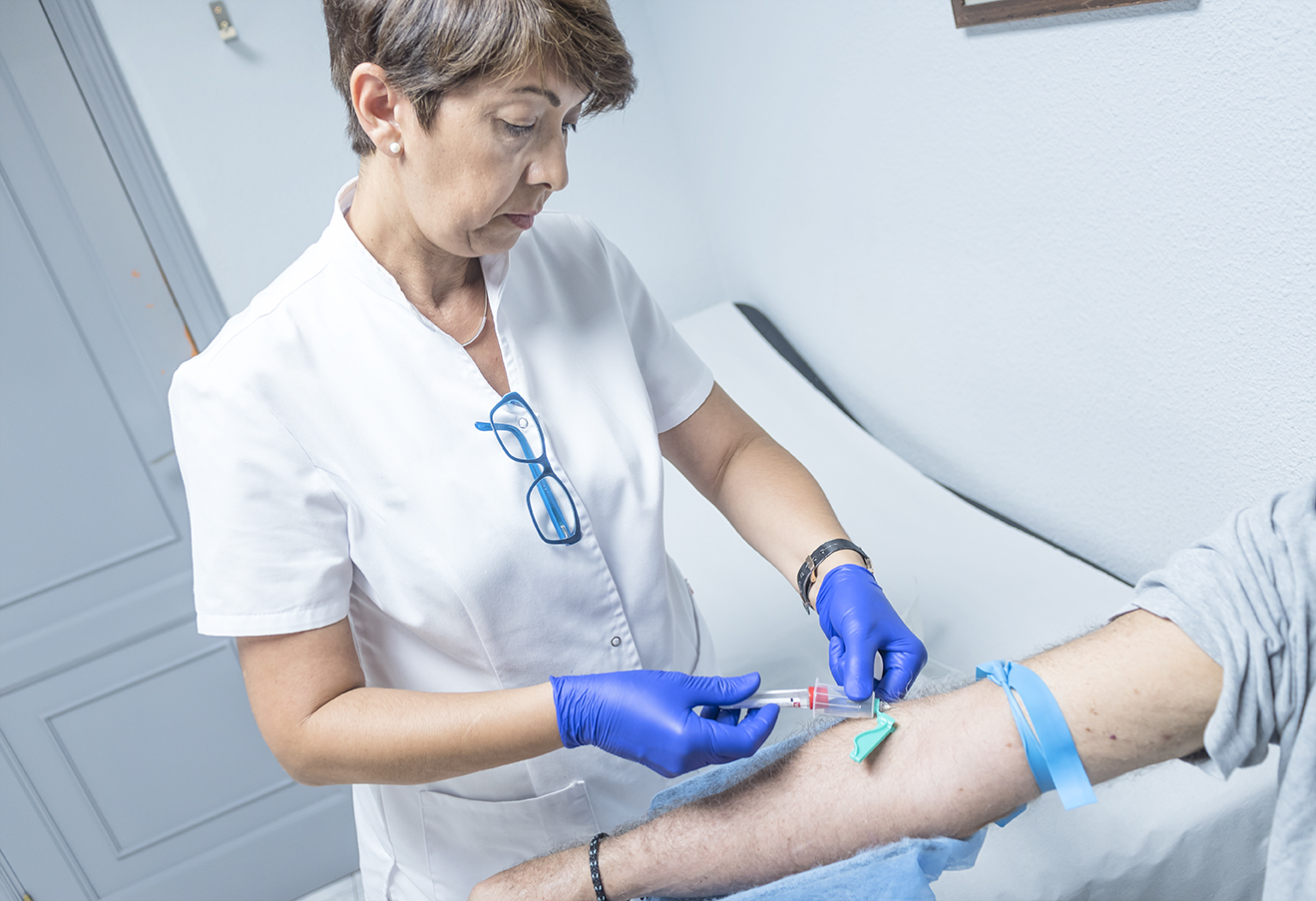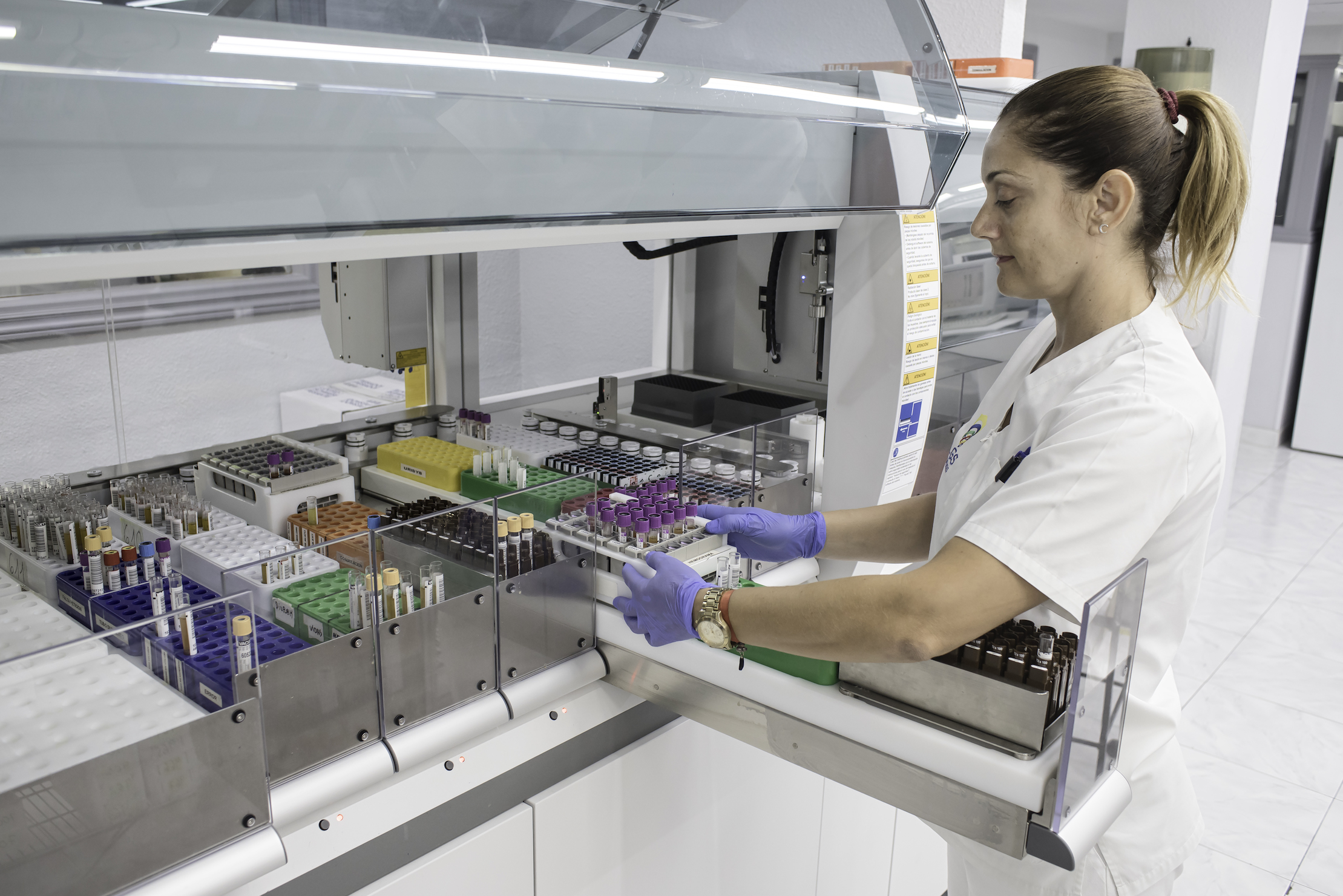
To make an accurate diagnosis, doctors require complementary tests, such as those performed and analysed in a clinical laboratory.
The laboratories are composed of multidisciplinary teams consisting of pharmacists, doctors, biologists, veterinarians and laboratory technicians. The purpose of this team is to analyse human biological samples that will help in the prevention, diagnosis and treatment of some diseases.
What samples are tested in a clinical laboratory?
The biological samples that are collected in order to perform the different types of tests are very varied. It can be blood, urine, stools, bone marrow, amniotic fluid or synovium, among others.

Types of tests performed in a clinical laboratory
- The blood count is one of the most requested tests. In the area of haematology, the components of the blood and the tissues that form it are studied (bone marrow, lymph nodes …)Biochemistry analyses the chemical elements of the liquid fraction, both blood and urine (glucose, cholesterol, triglycerides, uric acid, creatinine …)In the area of coagulation tests, the tests that are performed will allow to detect bleeding disorders, thrombotic and hypercoagulability states.In microbiology we find a wide variety of tests such as stool analysis, tumour markers, immunology (studies the immune system), endocrinology to evaluate the endocrine system, allergies and toxicology.

Clinical tests performed at This
Clinical Biochemistry
This analysis studies chemical elements of the liquid fraction of blood and urine, such as glucose, cholesterol, triglycerides …
Clinical haematology
This area studies the principal components of the blood and the haematopoietic tissues that compose it (lymph nodes, bone marrow, spleen …)
Immunology
In these tests, determinations related to the immune system are studied. The most frequent are rubella, HIV, herpes, chicken pox …
Endocrinology
Endocrinology is responsible of the study of disorders produced by the endocrine glands. These tests are performed: T3, free T3, T4, free T4, cortisol …
Allergies
The objective of these tests is to diagnose the allergic pathology identifying allergens. For this purpose, advanced immunoassay systems and chemiluminescent technology of high sensitivity and precision are used.
Microbiology
The purpose is identifying the microorganisms that cause infections present in the body and determine the sensitivity that this infection presents to antibiotics and antifungals to be able to treat it correctly.
Parasitology
This area studies parasites and their effects on people’s bodies.
Serology
Serology allows to identify the presence of antibodies in the blood. It is often done in blood donations and transfusions.
Toxicology
Through these tests, the presence of toxic substances in biological samples is studied. In general, the presence of drugs of abuse, drugs, pesticides …
Molecular biology
Molecular biology studies the biological processes that happen at the molecular level, between cellular systems such as between nucleic acids and proteins.
Genetic tests
These tests allow to identify possible alterations in the DNA sequence related to hereditary diseases or those known as ‘rare diseases’. They are also performed to identify congenital defects or anomalies in the development of the foetus during pregnancy.
Paternity
The analysis of paternity is performed to determine or exclude the genetic link between a supposed father and son.
Nutritional measurement and anti-aging
Aging is related to life habits and genetics. By performing these tests, you can know the patient’s health status to prevent diseases and pathological processes typical of aging as much as possible.
Pathological anatomy
This area allows to diagnose diseases through the analysis of biopsies, cytologies, autopsies or surgical pieces.
FNA
It is a fine needle aspiration biopsy that extracts a quantity of fluid and tissues that can diagnose Hodgkin’s lymphoma.
Immunohistochemistry
It consists of a colouring procedure that allows diagnosing diseases such as cancer, since it determines if there is cancer and at what exactly cellular protein level.
Molecular and second opinion studies
Those people who have doubts about the results of their tests performed in other laboratories can get a second opinion in our centres.
Video: What are the most common sexually transmitted diseases?
More information about Analysis of Sexual Transmission Diseases
Why you should do the tests in the Canary Islands?
The laboratories associated with This have:
- The most updated and advanced technology
- A wide range of clinical tests and analyses
- Adequate facilities
- Professional and experienced human team
- A quality system based on the ISO standard 9001:2015, a quality guarantee in the processes

EUROFINS LGS MEGALAB
Eurofins LGS Megalab is the largest private medical clinic in the Canary Islands in the field of blood tests. Founded in 1988, the clinic now has 35 centres in the Canary Islands and offers the highest levels of quality, privacy and efficiency.
It offers doctors and patients clinical and pathological analysis services, as well as the management of hemotherapy units. It also has an extensive catalogue of more than 3,500 tests.








